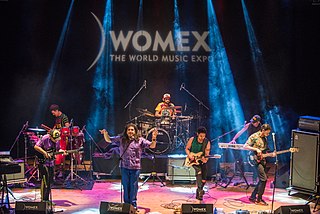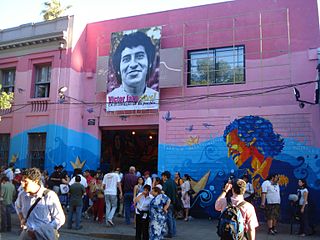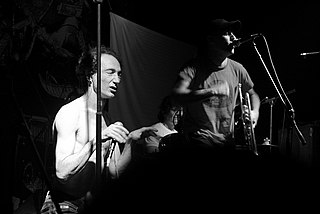
The music of Mexico is highly diverse, featuring a wide range of musical genres and performance styles. It has been influenced by a variety of cultures, primarily deriving from Europeans, Indigenous, and Africans. Music became an expression of Mexican nationalism starting in the nineteenth century.
Chilean rock is rock music and its corresponding subgenres produced in Chile or by Chileans. Chilean rock lyrics are usually sung in Spanish so can be considered as part of rock en español, although they are sometimes sung in English as well.
Mekatelyu is a Costa Rican band formed in December 1998 when Gabriel Dávila (Gabo), bassist of the band, began to search for a new style of music that would fuse reggae roots with different Caribbean and Latin rhythms.

Los de Abajo are a band from Mexico City founded in 1992 as a Latin ska four-piece. Since then they have expanded to eight members and widened their musical influences to include rock, salsa, reggae, ska, cumbia, Son Jarocho and banda sinaloense. Founder member Liber Terán is the main vocalist and writes many of the songs, although all band members receive equal pay for their contributions.

Bomba Estéreo is a Colombian band founded in Bogotá in 2005 by Simón Mejía. Their music has been described as "electro tropical" or "psychedelic cumbia".
The New Chilean Cumbia also known as New Chilean Cumbia Rock is a subgenre of cumbia music that originated in Chile in the early 2000s and that largely surfaced in mainstream media in 2009 and 2010. In contrast to older cumbias the lyrics of New Chilean Cumbia deals more with urban life and combines aspects of rock, hip hop and a wide variety of Latin American genres like Andean music, salsa, the son, reggae, boleros, ska, Latin-African music, diablada and even folklore from the Balkans, like the Klezmer, and Gipsy music.

Bareto is a music group from Peru, famous for making their own versions of classic Peruvian cumbia songs.
Lollapalooza Chile is the Chile-based version of the popular music festival Lollapalooza. It is the first edition of Lollapalooza to take place outside of the United States and is held in Santiago, Chile, since 2011.
Banda Conmoción are a Chilean ensemble band who mix cumbia and gypsy music with genres such as ska and cha-cha-cha. They are part of the new Latin-American fusion movement and emerged in the early nineties along with groups like Chico Trujillo and La Floripondio. They are also considered part of the New Chilean Cumbia movement.
Combo Ginebra is a Chilean musical ensemble of the New Chilean Cumbia style. The band emerged in 2004 as a traditional gypsy music duo featuring Álvaro Pacheco and Juan Pablo Cabello. The duo soon began incorporating cumbia rhythms into their repertoire and were joined by other instrumentalists to form a cumbia ensemble band.

Galpón Víctor Jara is a cultural center located in Santiago, Chile, in Barrio Brasil, an area of the city known for its strong artistic and cultural scene. Managed by the Víctor Jara Foundation, the center is named for the Chilean singer-songwriter and activist who was killed by the Chilean army following the Chilean coup of 11 September 1973. The Galpón is a popular live venue for Chilean bands, particularly those of the New Chilean Cumbia, gypsy and cueca musical styles, such as Chico Trujillo, Banda Conmoción and La Mano Ajena.
Juana Fe is a Chilean musical band that mixes popular Latin American rhythms such as salsa and cumbia with Jamaican ska. Alongside other New Chilean Cumbia bands such as La Mano Ajena, Tizana and Chico Trujillo, they form part of the new wave of Latin American fusion that became popular in the first decade of the 21st century. Juana Fe’s music is influenced by urban life and the political and social environment in Chile.
Sonora Palacios is one of Chile's oldest tropical orchestras. Formed in the early 1960s, the group is one of the main exponents of Chilean cumbia and were pioneers of the style. They were the first Chilean band to record cumbia and are widely recognized for establishing the popularity of cumbia in Chile.

Santaferia is a musical group from Chile. They play an eclectic style of new Chilean cumbia that they call cumbia casera, combining elements of Argentinian cumbia villera, ska, reggae, and other Latin music traditions. The group was formed in 2008, and includes ten members, playing guitar, bass, keyboards, brass instruments, and several types of percussion, in addition to vocals. They have released two albums, Le traigo cumbia in 2011, and Lo que va a pasar in 2013. Several of their songs have become hits in Chile, most notably Sakate Uno.

Las Manos de Filippi and also LMF, is a group of Argentine rock fusion and alternative style, which blends Caribbean Rhythms like cumbia, ska, hip hop, reggae and punk rock. His songs contain messages against capitalism, the International Monetary Fund and the political power shift, as well as a critical look at society, using as a basis the complaint, irony and humor. Its name comes sarcastically, by stealing the hands of Juan Domingo Perón and his fanaticism for the French band Mano Negra.

La Mosca Tsé-Tsé or simply La Mosca is an Argentine rock fusion band, whose music consists of different genres like ska, cumbia, merengue, salsa and pop rock. The group was formed in 1995. Their songs reflect sporadic and eternal love while maintaining some mischief in their lyrics. While the current line-up was consolidated in March 1995, the history of the band goes back to the early 1990s with 'La Reggae & Roll Band', who did covers and some of their own songs in the town of Ramallo.

Cumbia is a folkloric genre and dance from Colombia.

Roberto Enríquez Asenjo is a Spanish actor. He is known for his performances in television series such as Locked Up, Hispania, la leyenda and La señora or in films such as Fat People.

Son Rompe Pera is a Mexican fusion band based in Naucalpan, a suburb of Mexico City. Primarily playing cumbia they integrate the use of Mexican marimba music traditional in the folkloric of their country and such other genres as danzón, rock, ska and others.












